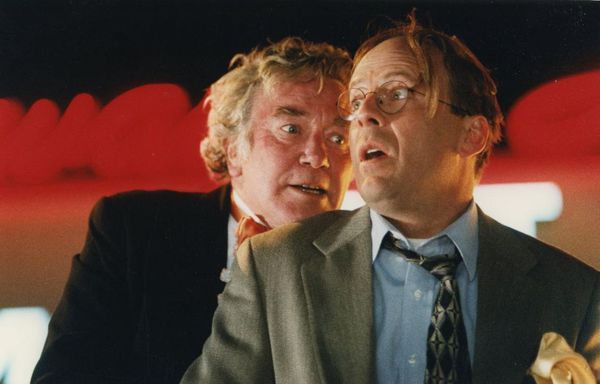 |
| Albert Finney as Kilgore Trout with Bruce Willis as Dwayne Hoover in Alan Rudolph’s adaptation of Kurt Vonnegut’s Breakfast of Champions |
In the second instalment of my conversation with Alan Rudolph on his adaptation of Kurt Vonnegut’s Breakfast Of Champions, shot by frequent collaborator Elliot Davis (Equinox; Mortal Thoughts; Love At Large), we start out with what his friend, the novelist Tom Robbins, who has a cameo (as Pesky Weber), told him after the film was finished.
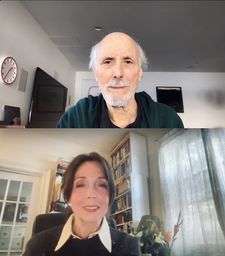 |
| Alan Rudolph with Anne-Katrin Titze on the influence of Jean Cocteau’s Orphée on final scene: “Probably not directly, but you know, every little drop of water feeds the plant.” |
The director/screenwriter has assembled the perfect cast of accomplices, including Albert Finney, Nick Nolte, Glenne Headly, Barbara Hershey, Omar Epps, Lukas Haas, Owen Wilson, Buck Henry, plus a hyperactive Bruce Willis starring as Dwayne Hoover, the ringleader of what goes on in Midland City.
Hoover’s face is on countless billboards and his commercials fill every TV screen. This is Hawaiian Week, they scream, and his car dealership is booming more than ever. Dwayne, whose wife Celia (Barbara Hershey, lethargic in her peignoir) pays more attention to the never-ending slogans than her husband, is looking for direction, for a sign. “I need to hear a truth I haven’t heard before,” he tells Francine (Glenne Headly) his assistant, but neither she nor the newly hired, freshly released prisoner Wayne Hoobler (Omar Epps), nor his manager Harry Le Sabre (Nick Nolte in full slapstick mode) can help him out with that.
From the Pacific Northwest, Alan Rudolph joined me on Zoom for an in-depth conversation on Breakfast Of Champions and his Robert Altman connection.
Anne-Katrin Titze: Breakfast Of Champions feels very fresh right now.
Alan Rudolph: My friend Tom Robbins is a novelist, who has a cameo in the movie. He told me after we finished, this is a career killer. He said, you don't have to worry about that. You don't have a career. You have a careen and he's right. And if you ask me, and I'm digging as deep as I can, if you ask me just what you just said. Career, which I never really thought about, but career aspect aside, financial aspect aside, emotional damage aspect aside, reputation, all of it.
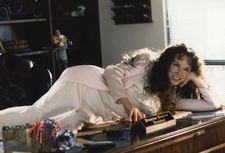 |
| Barbara Hershey as Dwayne Hoover's wife Celia |
Aside from when you first wrote the screenplay in ’73, or whenever to today, what would be the day you would choose to release this film? And I think I would honestly say exactly when it's opening four days before the American election, because people will go home. They'll watch the news and they'll come to this movie, and it'll seem like a tame documentary, a friendly little cartoon, compared to the madness out there now.
You know, I thought at the time everybody was in on the joke that we were being lied to as a culture forever. and that advertising was the most damaging thing you could be susceptible to where it replaces your most fragile, important part, your own identity, and replaces it with their version of your identity. So things are salty and sweet and sexy and shiny, and then, when they've used you up, they move on to the next person. And I thought, if we showed a film where this is, what happens when you go too far, people would love it. They didn't even want to know it existed. Now Dwayne Hoover even has bad hair, you know.
I mean, it's just like real life. Now. I told Bruce when we started, I don't usually talk to actors this way before, but I did. Somehow, I don't know why, he and I were at opposite ends of the political scale. But Bruce was a true artist. He's one of the most knowledgeable, witty, literate, funny, supportive people I've ever met. I mean he knows everything and he chose his path to true success, and I'm happy for him there. But I said, I look at Dwayne Hoover as every politician who ever ran for office in America, where they tell you everything but the truth.
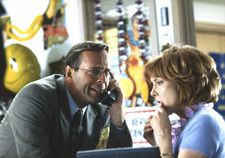 |
| Dwayne Hoover (Bruce Willis) with his assistant Francine (Glenne Headly) |
They'll skirt the issue. They'll do truthful flirtations, but they'll never tell you what's under or behind it, and they think they're important because of their track record, their bank account, their fame. Dwayne says, you can trust me and then, maybe, unlike most politicians, I won't say all politicians, but 99%, but then, like some politician, perhaps a little flicker inside them, starts to question it. Only they haven't had any self-enlightenment or exploration in their whole life, so they don't have the muscle to explore that they don't know what to do with it. So they look elsewhere for the answer. And here comes Kilgore Trout, who only spouts nonsense and they find the answer, and even then misinterpret it.
AKT: “I need to hear a truth I haven't heard before,” that's what Dwayne wants. That's what he needs. And there comes Kilgore to give it to him. I would like to ask you about that fantastic scene at the end, the going into the mirror, which reminded me of Orphée by Jean Cocteau. [The scene of moving through the mirror is featured also in Luca Guadagnino’s latest film, Queer]. Were you thinking of that?
AR: Probably not directly, but you know, every little drop of water feeds the plant. And Vonnegut said, I’m going to release you at the end of the book, to Kilgore, you know. And Kilgore's thing would be: make me young. I think. I don't know. I haven't read the book in decades, but maybe the last line somewhere near there was: “Make me young!”
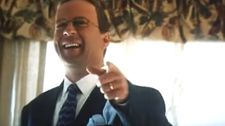 |
| A self confident Dwayne Hoover (Bruce Willis) |
AKT: That's very Faustian. That's Faust to Mephisto. He just wants to be young.
AR: Well, you're so much smarter than me, I mean, my references are Laurel and Hardy.
AKT: Who says, make me young to whom?
AR: Well, we all do to the big It, only we don't know what the It is, and as soon as someone contacts you with an answer, then it isn't a mystery anymore. And there are no questions. You know. I mean we're not going to go off on religion, but there shouldn't be an answer. You should have it inside of yourself that you know. Maybe not the answer. I don't think the answer is the answer. I think the quest to be part of something that you feel connected to that is greater than anything you've ever accomplished or could think of. That's what keeps people alive.
There's a line in the movie. It becomes the central line. Not in the book. It's an original line. Kilgore says the big mystery until you die. It's all life. Parenthetically, he's saying so live it, you know. But when the movie came out I read one review, which was enough, and they said, he said, you can't. It didn't follow the book. It didn't follow the tone of the book. It didn't do this, and the book is impossible to translate.
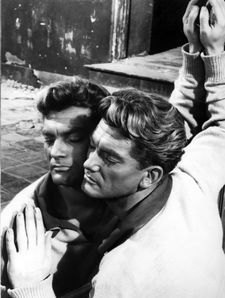 |
| Jean Marais in Jean Cocteau’s Orphée |
AKT: So that was your line? That line actually really got to me when I saw the movie last week. It made sense. A scene that I loved is Barbara Hershey packing for the journey, and what she packs in the suitcase is so absurd. I think it's some tissue paper and medications, a remote control, a pillow and a Victoria's Secret catalog, and she's wearing this nightgown and has the trapper hat and the yellow Wellies. And this is it, until you're dead. It's all life. This is her life. Dress for it and go!
AR: Very perceptive of you! In the book she's dead already.
AKT: Oh.
AR: She has died before the book is written and she died by drinking Drano. You know the sink unclogger? I didn't press it in the film, but in my mind she's not even there. If you could remove her from the film it would be exactly the same. She is the result of advertising's effect on the public. She believes it. She follows it, she trusts it. You can trust Dwayne Hoover, her husband, who is at work all day long, is on TV all day long, too, and that's her companion. And if you watch the film and remove her from every scene, the scenes don't change. I didn't articulate this on film.
Maybe if I did it again I'd do one thing which would sell it. But I didn't then. She's trying. She represents the warning to everyone. Look what happens if you believe this stuff, and she got that. I told her that up front and she knew it. She packed that bag. I didn't. I only put in the remote control. I said, you just figure out what you want to take with you. And she did it.
AKT: So that was her departure from non-being, from a being that is eaten up by commercials? I believed she very much existed at that moment of packing.
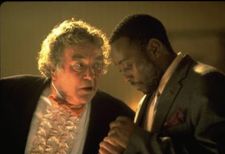 |
| Kilgore Trout (Albert Finney) with Wayne Hoobler (Omer Epps) |
AR: Well, you know, I mean, 100% of the people who see the film, if they discuss it, will never say, oh, she was dead, I mean, I didn't want to do that. Then they read the book, or maybe they've read the book before and said, well, I don't get it. She was dead in the book and maybe that'll open up a question. So 25 years later, when I'm dust, somebody will say, oh, maybe I had an idea, though, but I can't tell you, because I don't want you to say, oh, why didn’t you do that? But I had an idea at the time, and I didn't do it, and I'll live with it.
Read what Alan Rudolph had to say on Bruce Willis, Nick Nolte, Albert Finney, Owen Wilson in Breakfast Of Champions and his Robert Altman connection.
Breakfast Of Champions opened in New York at the Alamo Drafthouse Cinema in Lower Manhattan on Friday, November 1.





















